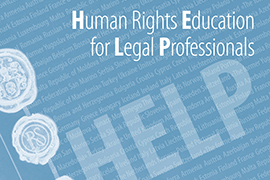Article
Protocol No. 16 and Legal Professionals
Protocol No. 16 to the European Convention on Human Rights was opened for signature on 21 October 2013, several months after Protocol No. 15. As with the latter, Protocol No. 16 is the direct result of a high-level Conference on the future of the Court, held in Brighton in April 2012 and which operated in keeping with the Izmir Conference of the preceding year. Although slightly further removed, it is also the result of an Expert Group report on the effectiveness of the Court, adopted in 2006.
Protocol No. 16 is an optional Protocol and will only enter into force after having received ten ratifications. Perhaps representative of the reluctance of many governments to adopt the optional Protocol is that fact that, as of 1 September 2014, only fourteen states have signed it and none have yet ratified it.
The new Protocol provides for an extension of the advisory jurisdiction of the Court far beyond the scope conferred upon it by Article 47 of the Convention, which operates in such restrictive terms that it is exercised in only a minute number of cases.
In developing this new instrument, government experts have sought to address four key issues:
- Who can request an advisory opinion?
Only the “highest courts” of a Contracting State may make this request. This would suggest that capacity lies primarily with supreme and constitutional courts. However, it was decided not to include an exhaustive list in the Protocol itself, but rather to allow each State to submit their own list to the Secretary General, which they may amend at any time.
- What can be the subject of an application for an advisory opinion?
The subject of an application must concern “issues of principle relating to the interpretation or application of the rights and freedoms defined in the Convention or its Protocols”. The criteria are particularly vague and general so as to grant to the Court greater freedom when considering applications. This is of particular relevance as the majority of the test cases do not seem to come within the remit of this category.
- What is the procedure for considering requests for advisory opinions?
The request must fall “within the framework of a pending case” before the court from which it emanates, which excludes an abstract review, such as those provided for by legislation. It must be substantiated and accompanied by the “relevant elements of the legal and factual context” of the case. A panel of five judges of the Grand Chamber shall decide on the acceptance of the application. Any refusal is justified. If accepted, it is the Grand Chamber which grants an advisory opinion, which is reasoned and published.
- What is the legal effect of an advisory opinion?
The Protocol makes it clear that advisory opinions are not binding. A party to the case before the national court retains his right of individual appeal to the Court, even if it is anticipated that matters dealt with in the advisory opinion will be declared inadmissible (?). Nor does the advisory opinion have direct effect on subsequent requests, but it will be incorporated into the jurisprudence of the Court, with the special authority that attaches to the decisions and judgments of the Grand Chamber.
Protocol No. 16 further complicates the Convention system and illustrates the activism of States in this area. It institutionalises in a certain manner the “dialogue of judges”, which is to say the collaboration between national and European judges. It reflects the desire to embody the principle of subsidiarity. Its implementation, however, may prove problematic and, without even mentioning the extra work awaiting the Court, several difficulties risk emerging.
The first of these difficulties concerns the filtering of requests for advisory opinions. This is a thorny task a priori. If the panel proves itself to be too strict, national supreme courts risk becoming disillusioned or discouraged, and justifications for refusal would be difficult to clarify. How is it to be explained that an application is of no interest because it is not a question of principle? If, on the other hand, the panel is perceived as being too soft, the Grand Chamber will be overloaded to the detriment of the cases brought before it following withdrawal or dismissal. (?)
The second difficulty concerns the coexistence of contentious and advisory jurisdictions. In other words, the Court is called upon to reconcile the examination of individual applications with the study of cases pending before the supreme and constitutional courts, and by consequence to harmonise the judgments of the chamber (?) with the advice of the Grand Chamber. One wouldn’t want to rule out overlaps, although it can be assumed that the advice given in certain areas… (?).
The third problem seems much more serious as it affects the issue fundamentally, relating to the scope of the advisory jurisdiction. Of course, the new Protocol should be applicable without prejudice to the “technical” provisions of the Convention, such as Articles 5, 6 and 7. Thus, the right to legal assistance of a person in custody lends itself easily to a uniform interpretation within the forty-seven Contracting States. On the other hand, the Protocol could cause some difficulties with regard to provisions which fall within the ‘domain/field of excellence’ (?) of the margin of appreciation of the States, for example, Articles 8-11 of the Convention and Article 1 of Protocol No. 1. Thus, the right to respect of privacy or freedom of expression are often founded in varying manners (?) which take into account national circumstances and the lack of a European consensus.
Due to lack of implementation in Strasbourg, it is clearly premature to comment on the added value of Protocol No. 16 with respect to the system of the Convention. Legal professionals can however see it as a promising tool, but one to be used in moderation. Judges and lawyers may wish to encourage their governments and their parliaments, for the sake of justice and litigants in Europe, to adopt the Protocol.
Vincent BERGER
Lawyer at the Paris Bar
Professor at the College of Europe
Former Legal Advisor to the European Court of Human Rights




